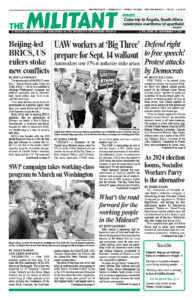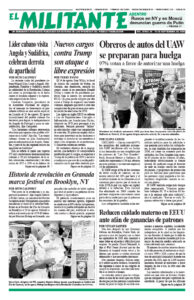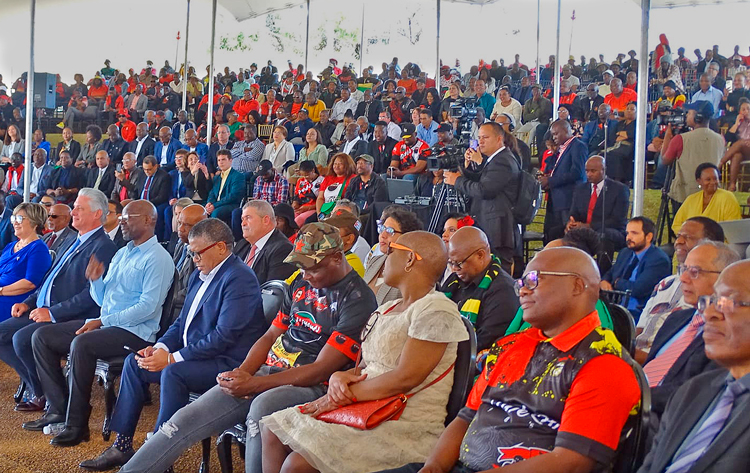Cuban President Miguel Díaz-Canel’s recent trip to Angola, Mozambique, Namibia and South Africa highlighted the Cuban Revolution’s decades of solidarity with — and participation in — the fight against colonial rule and imperialist exploitation in Africa.
Carolina Cerqueira, president of Angola’s National Assembly, introduced the Cuban president at a special session to welcome him Aug. 21 in Luanda, the capital. The Cuban people’s unconditional support was decisive in winning Angolan independence from Portugal and consolidating it, she said.
“Our Cuban brothers and sisters crossed the ocean to support the African people in their struggle,” Cerqueira said. “The Cuban troops were a fundamental pillar for independence for Angola, Namibia and the end of the racist apartheid regime in South Africa.”
She was referring to the 375,000 Cuban internationalist combatants — along with 50,000 health care, education, construction and other workers — who played a key role from 1975 to 1991 in defeating repeated invasions of Angola by the apartheid South African regime.
Díaz-Canel told the National Assembly that Fidel Castro said in 1988, “To be internationalists is to pay our debt to humanity and that whoever is not able to fight for others will never be able to fight adequately for themselves.”
Today there are 2,056 Cuban internationalists in the country, including nearly 1,200 health care workers. Six hundred of the Cuban medical personnel are helping to train 3,000 Angolans as doctors. “Angola is the African country where we have the most diverse and most numerous collaboration,” the Cuban president said.
During an Aug. 20 meeting between Díaz-Canel and Cuban volunteers in Luanda, construction engineer Wilfredo Ferrer took the floor. “The Cuban collaboration in Angola,” he said, “isn’t restricted to economic contracts. It shouldn’t be seen like that. Our cooperation is a synonym for solidarity, brotherhood. That’s how it was during the war and now during peace.”
Dr. Alejandro Naranjo told the meeting the Cuban volunteers help train the Angolans, but it is also a learning experience for the Cubans. “It allows us to see rare diseases or ones that have been eliminated in Cuba that the Angolan doctors, because they confront them every day, dominate the treatments and apply them successfully,” he said.
In South Africa some 800 people greeted the Cuban delegation at Freedom Park in Pretoria on Aug. 23 for a solidarity meeting attended by high-ranking officials of the Congress of South African Trade Unions, African National Congress, South African Communist Party and of the government, along with the Friends of Cuba Society and Cuban residents of the country.
The park, dedicated to telling the story of the fight against apartheid, features a wall with the names of 143,000 people who died during the struggle, including those of the more than 2,000 Cuban internationalists who fell in combat in Angola.
“From very early, Cuba denounced the incarceration of Nelson Mandela and his comrades at a time when alleged champions of freedom and human rights regarded them as terrorists,” Díaz-Canel told the crowd. “It’s a huge satisfaction to have made a contribution to the end of apartheid.”
After the overthrow of apartheid, one of Mandela’s first trips abroad was to Cuba, where he embraced Fidel Castro and joined him speaking to tens of thousands of Cubans at a July 26, 1991, rally in Matanzas. The rally celebrated the July 26, 1953, assault on the Fulgencio Batista dictatorship’s Moncada military base, the opening shot of the Cuban Revolution.
“The Cuban people hold a special place in the hearts of the people of Africa,” Mandela said. “The Cuban internationalists have made a contribution to African independence, freedom, and justice, unparalleled for its principled and selfless character.”
Many of the South African speakers at Freedom Park called for an end to the U.S. economic war on Cuba, its removal from the U.S. State Department’s list of “state sponsors of terrorism,” and for the return to Cuba of U.S. military-occupied Guantánamo.
While in South Africa, Díaz-Canel also attended and spoke at the BRICS summit in Pretoria.


